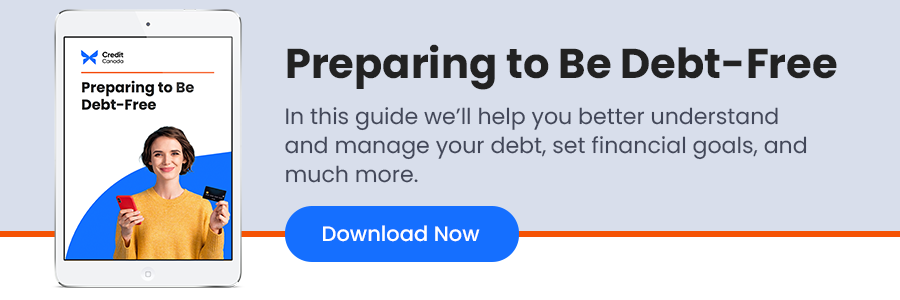
How to Pay Back CERB If You Owe Money
Job loss, complicated CERB applications, school closures, lockdowns — COVID-19 took a heavy toll on Canadians. Even with $2,000 monthly CERB benefits, many Canadians still felt financially strained. But what happens if you were accidentally overpaid?
What Do You Do If You Owe CERB?
Unfortunately, you have to pay it back.
The hardest part is that even if you were ineligible for part of the benefit, COVID-19 may have still affected you financially. For example, maybe you didn’t lose your job, but someone had to stay home to watch the kids during school closures.
So, repaying CERB might still be a burden.
Here at Credit Canada, our certified credit counsellors support people like you trying to get out of debt and regain control of their finances. Lately, we’ve been hearing about CERB overpayment notices from many clients.
Today, we’re going to break down exactly how to repay CERB and what to do if you don’t think you actually owe the debt.
Step 1: Read the Notice Carefully
The CRA has sent notices to people who owe CERB money. The “Notice of Debt” should contain the following information:
- The amount you owe (total balance)
- Reason for debt
- Payment occurrence date
- Contact number for more information
Keep this notice handy, so you can refer to it easily for our next step.
Step 2: Confirm Debt Notice Information is Correct
Did you really receive an overpayment? It’s likely, but not certain. Guess what: the CRA makes mistakes, too.
If you know you were ineligible for the payment, double-check your banking records to confirm you actually deposited it.
If you received the payment but are confident that the CRA’s reasoning for requesting repayment is inaccurate, gather evidence of your eligibility to prepare for disputing it.
Step 3: Prepare for a Phone Call
Whether you’re confident you owe the CERB repayment or not, it’s best to schedule a call with either the CRA or Service Canada (depending on the agency you applied for CERB through) to understand the entire situation. The personal nature of these phone calls warrants extensive security questions by the government representative.
You might have to prove your identity with past tax returns and identification information. Gather some of the following documents to prepare for your call:
- Tax information from the past three years: You might need to provide line details from your Notice of Assessment, T4s, or tax returns.
- Identification and address information: A common security question is to confirm your address and postal code.
- Bank statements: These should show records of CERB payment deposits (or lack thereof).
- CERB payment information: This includes cheques, emails, and any documentation describing your CERB history.
- Records of job loss or reduced hours: Gather paystubs, shift details, and employment letters or communications from the last two years to prove your CERB eligibility, if necessary.
Step 4: Call the CRA or Service Canada
Your notice of debt should contain a contact number to reach either the CRA or Service Canada to discuss your CERB overpayment.
If you applied for CERB through the CRA, you must contact the CRA. If you applied through Service Canada, then you must contact them.
Using the information from Step 3, answer the representative's security questions and find out any additional details about your case.
You might want to:
- Confirm where to repay your debt balance
- Ask about instructions for disputing the debt
- Present any evidence
If by the end of your phone call you know you owe money, keep reading for the next step.
Step 5: Repay Your Debt
If you know you were overpaid, you’ll need to send back the money to the agency with whom you originally applied.
If you applied for CERB with the CRA:
- Pay online through online banking, PaySimply, or your CRA account.
- Mail a cheque or money order to the following address, payable to the Receiver General for Canada:
Revenue Processing — Repayment of CERB
Sudbury Tax Centre
1050 Notre Dame Avenue
Sudbury, ON P3A 0C3
- Pay in person using a QR code at a Canada Post location.
If you applied for CERB with Service Canada:
- Pay through online banking
- Mail a cheque or money order
If you can’t remember how you applied for CERB:
- Review the Government of Canada’s support section for those who aren’t sure how they applied
Keep in mind that the CRA is flexible due to the hardship COVID-19 caused to so many people. This means you can likely negotiate a payment plan with them to space out your payments.
But what if you’re sure you don’t actually owe any CERB payments? Time to submit a new request!
Step 6: Request Reconsideration of Your Debt
During your Service Canada or CRA phone call, you might dispute your debt balance or present evidence to urge them to reconsider. You may be able to complete this process over the phone, but follow any instructions the representative gives you to submit a reconsideration request with Service Canada.
Note: Service Canada will likely need 21-30 days to rule on your request.
Step 7: Wait and Inform the CRA
During your waiting period, call the CRA to let them know you’re waiting on a reconsideration request. This will ensure you aren’t penalized for late payment.
Find Debt Relief with Credit Canada
CERB overpayment might feel like yet another financial stress. We understand how frustrating it is to feel like you’re always in debt. That’s why we’re here — to help you get through it with proven debt solutions and credit counselling.
Need support paying down debts or talking through some financial stresses? Contact one of our certified credit counsellors today!
Frequently Asked Questions
Have questions? We are here to help
A Debt Consolidation Program (DCP) is an arrangement made between your creditors and a non-profit credit counselling agency. Working with a reputable, non-profit credit counselling agency means a certified Credit Counsellor will negotiate with your creditors on your behalf to drop the interest on your unsecured debts, while also rounding up all your unsecured debts into a single, lower monthly payment. In Canada’s provinces, such as Ontario, these debt payment programs lead to faster debt relief!
Yes, you can sign up for a DCP even if you have bad credit. Your credit score will not impact your ability to get debt help through a DCP. Bad credit can, however, impact your ability to get a debt consolidation loan.
Most people entering a DCP already have a low credit score. While a DCP could lower your credit score at first, in the long run, if you keep up with the program and make your monthly payments on time as agreed, your credit score will eventually improve.
Anyone who signs up for a DCP must sign an agreement; however, it's completely voluntary and any time a client wants to leave the Program they can. Once a client has left the Program, they will have to deal with their creditors and collectors directly, and if their Counsellor negotiated interest relief and lower monthly payments, in most cases, these would no longer be an option for the client.

